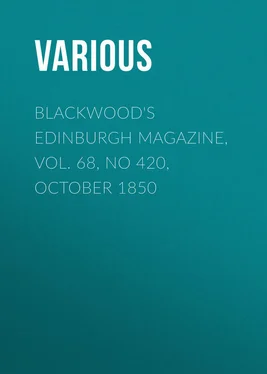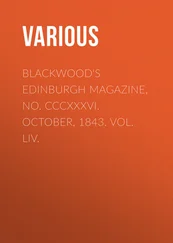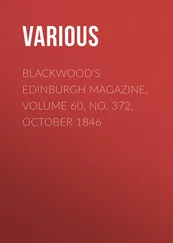Various - Blackwood's Edinburgh Magazine, Vol. 68, No 420, October 1850
Здесь есть возможность читать онлайн «Various - Blackwood's Edinburgh Magazine, Vol. 68, No 420, October 1850» — ознакомительный отрывок электронной книги совершенно бесплатно, а после прочтения отрывка купить полную версию. В некоторых случаях можно слушать аудио, скачать через торрент в формате fb2 и присутствует краткое содержание. Издательство: Иностранный паблик, Жанр: periodic, foreign_edu, Путешествия и география, на английском языке. Описание произведения, (предисловие) а так же отзывы посетителей доступны на портале библиотеки ЛибКат.
- Название:Blackwood's Edinburgh Magazine, Vol. 68, No 420, October 1850
- Автор:
- Издательство:Иностранный паблик
- Жанр:
- Год:неизвестен
- ISBN:нет данных
- Рейтинг книги:4 / 5. Голосов: 1
-
Избранное:Добавить в избранное
- Отзывы:
-
Ваша оценка:
- 80
- 1
- 2
- 3
- 4
- 5
Blackwood's Edinburgh Magazine, Vol. 68, No 420, October 1850: краткое содержание, описание и аннотация
Предлагаем к чтению аннотацию, описание, краткое содержание или предисловие (зависит от того, что написал сам автор книги «Blackwood's Edinburgh Magazine, Vol. 68, No 420, October 1850»). Если вы не нашли необходимую информацию о книге — напишите в комментариях, мы постараемся отыскать её.
Blackwood's Edinburgh Magazine, Vol. 68, No 420, October 1850 — читать онлайн ознакомительный отрывок
Ниже представлен текст книги, разбитый по страницам. Система сохранения места последней прочитанной страницы, позволяет с удобством читать онлайн бесплатно книгу «Blackwood's Edinburgh Magazine, Vol. 68, No 420, October 1850», без необходимости каждый раз заново искать на чём Вы остановились. Поставьте закладку, и сможете в любой момент перейти на страницу, на которой закончили чтение.
Интервал:
Закладка:
Each of the trials is preceded and followed by "Introductory Essays" and "Notes."
"The Essays, chiefly historical, have been introduced in order to familiarise the reader with the subject, and prevent the monotony which, but for these occasional dissertations, might pervade so many recurring trials. The notes are added with a similar object." 4 4 Introduction, p. ix.
We may say generally, that these "Essays" and "Notes" always display judgment, and the writer's complete knowledge of his subject. No reader should enter on the trial, without carefully perusing the "Essay" which ushers it in, shedding light upon all its details, and the circumstances attending the committing of these offences – and indicating with distinctness the leading features of interest and importance. In the report of the trial itself, great pains have evidently been taken, and successfully, to observe rigid impartiality, and secure accuracy of statement; and the conflicts of counsel with each other and with witnesses – the temperate, and timely interpositions of the judges, and their satisfactory summings-up to the jury – are presented to the reader with no little vividness. The fault of Mr Townsend's style is, diffuseness, a tendency to colloquiality, and a deficiency of vigour. With these little exceptions, added to that above noticed, we have no hesitation in commending these volumes as an acquisition to popular and professional literature, reflecting credit on the author's memory, and the bar to which he belonged.
Having thus briefly indicated the general character of this work, and given the author's own account of it, we propose in the present, and one, or perhaps two, following articles, to take our own view of some of the leading "Trials" thus collected by Mr Townsend, incidentally observing on his treatment of the subject. With him, we regard several of these trials as exhibiting features of remarkable interest; and are much indebted to him for having so disposed his materials as to rouse and rivet the attention of all classes of intelligent readers, but in an especial degree that of the youthful student of jurisprudence. Without further preface, we shall commence with that which stands first in Mr Townsend's collection – the trial of Frost, for high treason.
This affords a very favourable specimen of Mr Townsend's capabilities. He appears to have worked it out perhaps more exactly to his own idea than any of the ensuing ones; and, by his able and judicious treatment of the subject, has given us an opportunity of exhibiting in glowing colours a forensic battle-field: the stake, life or death; the combatants, evenly matched, the very flower of the bar; their tactics clear and decisive, with the odds tremendously against one party – that is to say, facts too strong for almost any degree of daring or astuteness to contend against hopefully. Let us see, under such circumstances, how the combatants acquitted themselves; or, if one may change the figure, let us see how was played a great game of chess on the board of life, by skilful and celebrated players. Who were they? Four in number – Sir John Campbell and Sir Thomas Wilde, then respectively Attorney and Solicitor-General, representing the Crown; Sir Frederick Pollock and Mr Fitzroy Kelly, Queen's Counsel for the prisoner. Ten years have since elapsed, and behold the changes in the relative positions of these gentlemen! Sir John Campbell is a peer of the realm, and Lord Chief-Justice of the Queen's Bench: having also, during the interval, become a laborious and successful biographer of the Lord Chancellors and Lord Chief-Justices of England. Sir Thomas Wilde is also a peer of the realm, and Lord High Chancellor, having been previously Attorney-General and Chief-Justice of the Common Pleas. Sir Frederick Pollock, having been subsequently appointed Attorney-General, is now Chief Baron of the Exchequer; while Mr Kelly, having since become Solicitor-General, lost office on the break-up of Sir Robert Peel's ministry, and remains – such are the chances and changes of political life – plain Sir Fitzroy Kelly, but occupying a splendid position at the bar. These four were the leading counsel; but besides the Attorney and Solicitor General, the Crown was represented by two gentlemen of great legal learning and eloquence, since raised to the bench – Mr Justice Wightman and Mr Justice Talfourd; and by Mr Serjeant Ludlow, since become a Commissioner of Bankruptcy; and the Hon. John C. Talbot, now so highly distinguished in Parliamentary practice. The judges sent as the special commission consisted of the late Chief-Justice Tindal, the present Mr Baron Parke, and the late Mr Justice Williams, forming, it is superfluous to say, an admirably constituted court – the chief being most consummately qualified for his post by temper, sagacity, and learning.
It was the business of the Attorney and Solicitor General to establish a case of high treason against the prisoner, and of Sir Frederick Pollock and Mr Kelly to defend him à l'outrance ; but God forbid that we should say per fas aut nefas . It were idle to characterise the intellectual and professional qualifications of these four combatants; the eminence of all is undisputed, though their idiosyncrasies are widely different from each other. Suffice it to say, that everything which great experience, sagacity, learning, power, and eloquence could bring to bear on that contest might have been confidently looked for. One circumstance is proper to be borne in mind – that the prisoner's counsel (of course abhorring the acts imputed to their client) were stimulated to the very uttermost exertion by the fact that their own political opinions were notoriously adverse to those entertained by the prisoner, and those – viz., Chartists – who so confidently summoned two Tories to the rescue of their imperilled brother Chartists.
All the main facts of the case were universally known before the trial took place, together, of course, with the legal category to which they must be referred, to satisfy the conditions of high treason. The nature of that offence was thus tersely and beautifully explained by the Chief Justice, — 5 5 Townsend, vol. i. pp. 1, 2.
"Gentlemen, the crime of high treason, in its own direct consequences, is calculated to produce the most malignant effects upon the community at large; its direct and immediate tendency is the putting down the authority of the law, the shaking and subverting the foundation of all government, the loosening and dissolving the bands and cement by which society is held together, the general confusion of property, the involving a whole people in bloodshed and mutual destruction; and, accordingly, the crime of high treason has always been regarded by the law of this country as the offence of all others of the deepest dye, and as calling for the severest measure of punishment. But in the very same proportion as it is dangerous to the community, and fearful to the offender from the weight of punishment which is attached to it, has it been thought necessary by the wisdom of our ancestors to define and limit this law within certain express boundaries, in order that, on the one hand, no guilty person might escape the punishment due to his transgression by an affected ignorance of the law; and, on the other, that no innocent man might be entangled or brought unawares within the reach of its severity by reason of the law's uncertainty."
The following were fearful words to be heard, or afterwards read, by those who were charged with the defence of Frost. They occur, like the preceding passage, in the luminous charge of the Chief Justice to the Grand Jury, on the 10th December 1839: —
"An assembly of men, armed and arrayed in a warlike manner, with any treasonable purpose, is a levying of war, although no blow be struck; and the enlisting and drilling and marching bodies of men are sufficient overt acts of that treason, without coming to a battle or action. And, if this be the case, the actual conflict between such a body and the Queen's forces must, beyond all doubt, amount to a levying of war against the Queen, under the statute of Edward. It was quite unnecessary to constitute the guilt of treason that the tumultuous multitude should be accompanied with the pomp and pageantry of war, or with military array. Insurrection and rebellion are more humble in their first infancy; but all such external marks of pomp will not fail to be added with the first gleam of success. The treasonable design once established by the proper evidence, the man who instigated, incited, procured, or persuaded others to commit the act, though not present in person at the commission of it, is equally a traitor, to all intents and purposes, as the man by whose hand the act of treason is committed. He who leads the armed multitude towards the point of attack, and then retires before the blow is struck – he who remains at home, planning and directing the proceedings, but leaving the actual execution of such plans to more daring hands – he who, after treason has been committed, knowingly harbours or conceals the traitor from the punishment due to him, all these are equally guilty in the eye of the law of the crime of high treason."
Читать дальшеИнтервал:
Закладка:
Похожие книги на «Blackwood's Edinburgh Magazine, Vol. 68, No 420, October 1850»
Представляем Вашему вниманию похожие книги на «Blackwood's Edinburgh Magazine, Vol. 68, No 420, October 1850» списком для выбора. Мы отобрали схожую по названию и смыслу литературу в надежде предоставить читателям больше вариантов отыскать новые, интересные, ещё непрочитанные произведения.
Обсуждение, отзывы о книге «Blackwood's Edinburgh Magazine, Vol. 68, No 420, October 1850» и просто собственные мнения читателей. Оставьте ваши комментарии, напишите, что Вы думаете о произведении, его смысле или главных героях. Укажите что конкретно понравилось, а что нет, и почему Вы так считаете.












